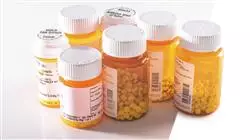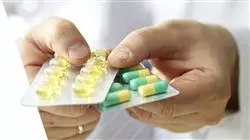University certificate
The world's largest faculty of pharmacy”
Introduction to the Program
TECH offers you a unique academic experience that will allow you to be up to date in Advanced Neuropharmacology, without neglecting your personal responsibilities”

Patients suffering from pathologies with a high incidence such as Epilepsy, frequent Migraine or the autoimmune disease Myasthenia Gravis have found in pharmacological advances important advances in their treatments and diagnoses. In this sense, studies on neurological diseases have made it possible to improve the quality of life of the people who suffer from them and to incorporate the most relevant advances into clinical practice.
In this context, pharmacists, especially those in hospital environments, must be aware of the most notorious progress, the techniques used for patient management and the pharmacology used. Thus, this 6-month Postgraduate diploma in Advanced Neuropharmacology was born.
It is an intensive program that provides students with advanced information on the pathophysiology and drugs used for the main diseases affecting the Central Nervous System, as well as those used for seizures and headaches. Likewise, special emphasis will be placed on treatments for surgical and polytraumatized patients.
To achieve this update, the graduates have at their disposal video summaries of each topic, in in focus videos, case studies and specialized readings to further extend the information provided in this syllabus.
Undoubtedly, a unique opportunity to get a quality update through a convenient and flexible academic proposal. The pharmacist only needs a mobile device, tablet or computer with Internet connection to view the content hosted on the virtual platform at any time of the day. An ideal option for those seeking to reconcile their daily activities with a cutting-edge program.
Thanks to the Relearning method you will be able to reduce the long hours of study and consolidate the concepts addressed in less time”
This Postgraduate diploma in Advanced Neuropharmacology contains the most complete and up-to-date scientific program on the market. The most important features include:
- The development of practical cases presented by experts in Pharmacy, Hospital Management, among others
- Graphic, schematic, and practical contents with which they are created, provide scientific and practical information on the disciplines that are essential for professional practice
- Practical exercises where self-assessment can be used to improve learning
- Its special emphasis on innovative methodologies
- Theoretical lessons, questions to the expert, debate forums on controversial topics, and individual reflection assignments
- Content that is accessible from any fixed or portable device with an Internet connection
This academic proposal will keep you up to date with the latest scientific evidence on pharmacology in patients with cerebral edema”
The program’s teaching staff includes professionals from sector who contribute their work experience to this educational program, as well as renowned specialists from leading societies and prestigious universities.
Its multimedia content, developed with the latest educational technology, will provide the professionals with situated and contextual learning, i.e., a simulated environment that will provide an immersive education programmed to learn in real situations.
The design of this program focuses on Problem-Based Learning, by means of which the professionals must try to solve the different professional practice situations that are presented throughout the academic course. For this purpose, the students will be assisted by an innovative interactive video system created by renowned experts.
TECH adapts to you and for this reason has created an online program without classes with restricted schedules. Get updated at your own pace"

With this university qualification you will be up to date with emerging therapies for Migraine"
Why study at TECH?
TECH is the world’s largest online university. With an impressive catalog of more than 14,000 university programs available in 11 languages, it is positioned as a leader in employability, with a 99% job placement rate. In addition, it relies on an enormous faculty of more than 6,000 professors of the highest international renown.

Study at the world's largest online university and guarantee your professional success. The future starts at TECH”
The world’s best online university according to FORBES
The prestigious Forbes magazine, specialized in business and finance, has highlighted TECH as “the world's best online university” This is what they have recently stated in an article in their digital edition in which they echo the success story of this institution, “thanks to the academic offer it provides, the selection of its teaching staff, and an innovative learning method aimed at educating the professionals of the future”
A revolutionary study method, a cutting-edge faculty and a practical focus: the key to TECH's success.
The most complete study plans on the university scene
TECH offers the most complete study plans on the university scene, with syllabuses that cover fundamental concepts and, at the same time, the main scientific advances in their specific scientific areas. In addition, these programs are continuously being updated to guarantee students the academic vanguard and the most in-demand professional skills. In this way, the university's qualifications provide its graduates with a significant advantage to propel their careers to success.
TECH offers the most comprehensive and intensive study plans on the current university scene.
A world-class teaching staff
TECH's teaching staff is made up of more than 6,000 professors with the highest international recognition. Professors, researchers and top executives of multinational companies, including Isaiah Covington, performance coach of the Boston Celtics; Magda Romanska, principal investigator at Harvard MetaLAB; Ignacio Wistumba, chairman of the department of translational molecular pathology at MD Anderson Cancer Center; and D.W. Pine, creative director of TIME magazine, among others.
Internationally renowned experts, specialized in different branches of Health, Technology, Communication and Business, form part of the TECH faculty.
A unique learning method
TECH is the first university to use Relearning in all its programs. It is the best online learning methodology, accredited with international teaching quality certifications, provided by prestigious educational agencies. In addition, this disruptive educational model is complemented with the “Case Method”, thereby setting up a unique online teaching strategy. Innovative teaching resources are also implemented, including detailed videos, infographics and interactive summaries.
TECH combines Relearning and the Case Method in all its university programs to guarantee excellent theoretical and practical learning, studying whenever and wherever you want.
The world's largest online university
TECH is the world’s largest online university. We are the largest educational institution, with the best and widest online educational catalog, one hundred percent online and covering the vast majority of areas of knowledge. We offer a large selection of our own degrees and accredited online undergraduate and postgraduate degrees. In total, more than 14,000 university degrees, in eleven different languages, make us the largest educational largest in the world.
TECH has the world's most extensive catalog of academic and official programs, available in more than 11 languages.
Google Premier Partner
The American technology giant has awarded TECH the Google Google Premier Partner badge. This award, which is only available to 3% of the world's companies, highlights the efficient, flexible and tailored experience that this university provides to students. The recognition as a Google Premier Partner not only accredits the maximum rigor, performance and investment in TECH's digital infrastructures, but also places this university as one of the world's leading technology companies.
Google has positioned TECH in the top 3% of the world's most important technology companies by awarding it its Google Premier Partner badge.
The official online university of the NBA
TECH is the official online university of the NBA. Thanks to our agreement with the biggest league in basketball, we offer our students exclusive university programs, as well as a wide variety of educational resources focused on the business of the league and other areas of the sports industry. Each program is made up of a uniquely designed syllabus and features exceptional guest hosts: professionals with a distinguished sports background who will offer their expertise on the most relevant topics.
TECH has been selected by the NBA, the world's top basketball league, as its official online university.
The top-rated university by its students
Students have positioned TECH as the world's top-rated university on the main review websites, with a highest rating of 4.9 out of 5, obtained from more than 1,000 reviews. These results consolidate TECH as the benchmark university institution at an international level, reflecting the excellence and positive impact of its educational model.” reflecting the excellence and positive impact of its educational model.”
TECH is the world’s top-rated university by its students.
Leaders in employability
TECH has managed to become the leading university in employability. 99% of its students obtain jobs in the academic field they have studied, within one year of completing any of the university's programs. A similar number achieve immediate career enhancement. All this thanks to a study methodology that bases its effectiveness on the acquisition of practical skills, which are absolutely necessary for professional development.
99% of TECH graduates find a job within a year of completing their studies.
Postgraduate Diploma in Advanced Neuropharmacology
Neurological pharmacology is a branch of medicine that has become increasingly relevant due to the rising incidence of neurological diseases worldwide. These conditions, such as Alzheimer's, Parkinson's and multiple sclerosis, are affecting more and more people and require a specialized approach to their treatment. This is why the importance of having an academic program, such as the Postgraduate Diploma in Advanced Neurological Pharmacology, becomes evident. This study has been designed with the aim of training health professionals in the management of drugs used in the treatment of diseases of the nervous system. In this program, topics such as pharmacokinetics and pharmacodynamics of neurological drugs, as well as their mechanism of action and adverse effects are addressed. In addition, the different routes of administration of these drugs are studied and their interaction with other drugs is discussed in depth.
Study 100% online
If you do not have time to travel anywhere to study, TECH makes it easy for you and has designed this Postgraduate Diploma 100% online, where you can enjoy workshops, lectures and didactic learning material such as multimedia pills, virtual library and complementary readings. In addition, this academic program allows health professionals to acquire knowledge and skills that will enable them to participate in research and clinical trials in the area of neurological pharmacology. Research is essential to advance the treatment of these diseases and to find new, more effective and less invasive therapies. In summary, the Postgraduate Diploma in Advanced Neurological Pharmacology is an academic program of great relevance today. Training in this field is essential for health professionals who wish to specialize in the treatment of neurological diseases. Staying abreast of the latest advances in neurological pharmacology will make a difference in drug management and quality of life for patients.







